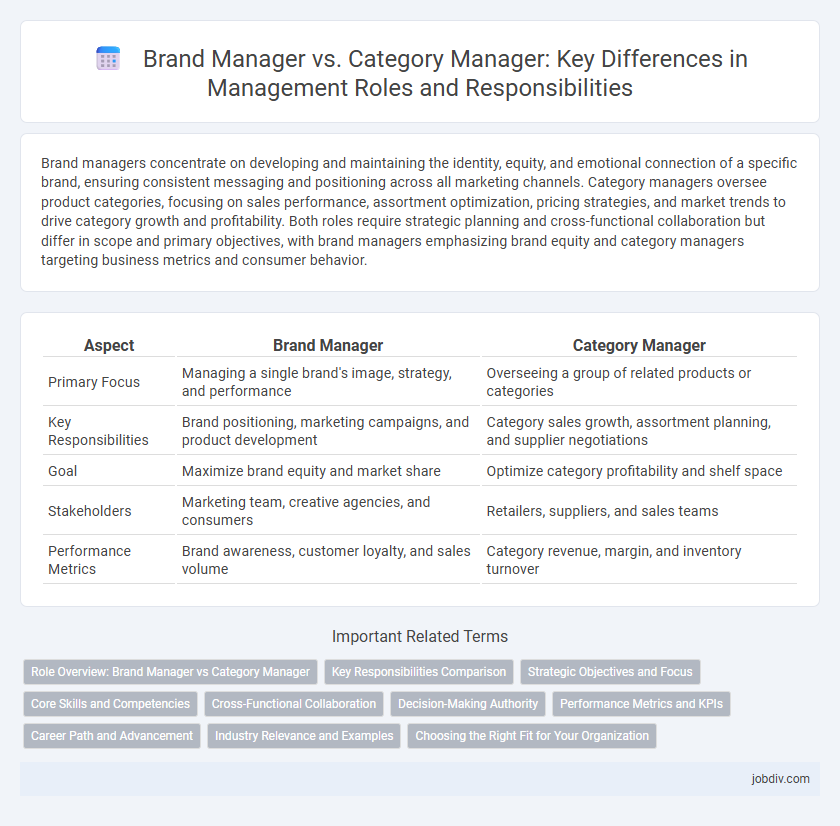Brand managers concentrate on developing and maintaining the identity, equity, and emotional connection of a specific brand, ensuring consistent messaging and positioning across all marketing channels. Category managers oversee product categories, focusing on sales performance, assortment optimization, pricing strategies, and market trends to drive category growth and profitability. Both roles require strategic planning and cross-functional collaboration but differ in scope and primary objectives, with brand managers emphasizing brand equity and category managers targeting business metrics and consumer behavior.
Table of Comparison
| Aspect | Brand Manager | Category Manager |
|---|---|---|
| Primary Focus | Managing a single brand's image, strategy, and performance | Overseeing a group of related products or categories |
| Key Responsibilities | Brand positioning, marketing campaigns, and product development | Category sales growth, assortment planning, and supplier negotiations |
| Goal | Maximize brand equity and market share | Optimize category profitability and shelf space |
| Stakeholders | Marketing team, creative agencies, and consumers | Retailers, suppliers, and sales teams |
| Performance Metrics | Brand awareness, customer loyalty, and sales volume | Category revenue, margin, and inventory turnover |
Role Overview: Brand Manager vs Category Manager
Brand Managers focus on developing and maintaining a brand's identity, ensuring consistency across all marketing channels to drive customer loyalty and market equity. Category Managers oversee product categories by analyzing market trends, managing inventory, and optimizing sales strategies to maximize category profitability. Both roles require cross-functional collaboration but differ in scope, with Brand Managers prioritizing brand perception and Category Managers emphasizing product assortment and business performance.
Key Responsibilities Comparison
A Brand Manager focuses on developing and executing strategies to enhance brand equity, overseeing product positioning, marketing campaigns, and customer engagement specific to the brand. A Category Manager is responsible for managing a product category's overall performance, including assortment planning, pricing strategies, supplier negotiations, and inventory management to maximize category profitability. While Brand Managers drive brand-centric initiatives, Category Managers prioritize optimizing the entire category's market share and operational efficiency.
Strategic Objectives and Focus
Brand Managers concentrate on building brand equity and customer loyalty through targeted marketing campaigns and consistent messaging, ensuring alignment with the overall brand vision. Category Managers focus on optimizing product assortments, pricing strategies, and supplier negotiations to maximize category sales and profitability within retail or distribution channels. Both roles drive revenue growth but differ in strategic objectives, with Brand Managers emphasizing brand positioning and Category Managers prioritizing category performance and market share.
Core Skills and Competencies
Brand Managers excel in strategic marketing, creative development, and consumer insight analysis to build brand equity and drive customer loyalty. Category Managers specialize in data-driven assortment planning, vendor negotiations, and supply chain optimization to maximize category profitability and market share. Both roles demand strong leadership, analytical capabilities, and cross-functional collaboration skills to effectively influence business outcomes.
Cross-Functional Collaboration
Brand Managers drive cross-functional collaboration by aligning marketing, product development, and sales teams to build consistent brand identity and customer experience. Category Managers focus collaboration efforts on coordinating with supply chain, merchandising, and sales teams to optimize product assortment, pricing, and inventory management within specific categories. The synergy between Brand and Category Managers ensures cohesive strategies that enhance market positioning and operational efficiency.
Decision-Making Authority
Brand Managers hold decision-making authority primarily over brand strategy, marketing campaigns, and product positioning to enhance brand equity and consumer loyalty. Category Managers oversee broader category performance, including assortment planning, pricing strategies, and supplier negotiations, aiming to maximize category profitability and market share. The distinction lies in Brand Managers focusing on singular brand success, while Category Managers make decisions that impact multiple brands within a product category.
Performance Metrics and KPIs
Brand Managers focus on performance metrics such as brand awareness, customer loyalty, and market share growth, tracking KPIs like brand equity score, customer retention rates, and net promoter score (NPS). Category Managers prioritize sales volume, margin improvement, and inventory turnover, using KPIs including category profitability, sell-through rates, and stock-to-sales ratios. Both roles leverage data-driven insights, but Brand Managers emphasize consumer perception while Category Managers optimize product assortment and pricing strategies.
Career Path and Advancement
Brand Managers typically advance by deepening expertise in market research, consumer behavior, and product positioning, often progressing to senior brand or marketing director roles. Category Managers focus on product assortment, pricing strategies, and supplier negotiations, paving the way to roles such as category director or merchandising head. Both paths offer leadership opportunities, but Brand Managers usually emphasize brand equity growth while Category Managers drive profitability through category optimization.
Industry Relevance and Examples
Brand Managers focus on developing and maintaining a specific brand's identity, ensuring consistent messaging across marketing channels, and driving brand loyalty within industries like consumer goods and fashion. Category Managers oversee a product category's overall strategy, sales performance, and assortment planning, often working in retail sectors such as supermarkets and e-commerce platforms. Companies like Procter & Gamble employ Brand Managers to cultivate individual product lines, while retailers like Walmart utilize Category Managers to optimize inventory and meet consumer demand across product categories.
Choosing the Right Fit for Your Organization
Selecting between a Brand Manager and a Category Manager depends on your organization's strategic priorities and product focus. A Brand Manager specializes in building and maintaining brand equity, driving consumer engagement, and managing brand positioning and messaging across channels. In contrast, a Category Manager focuses on optimizing product assortment, pricing, and promotions within a specific category to maximize sales and profitability, making the choice critical based on whether brand growth or category performance is the primary goal.
Brand Manager vs Category Manager Infographic

 jobdiv.com
jobdiv.com